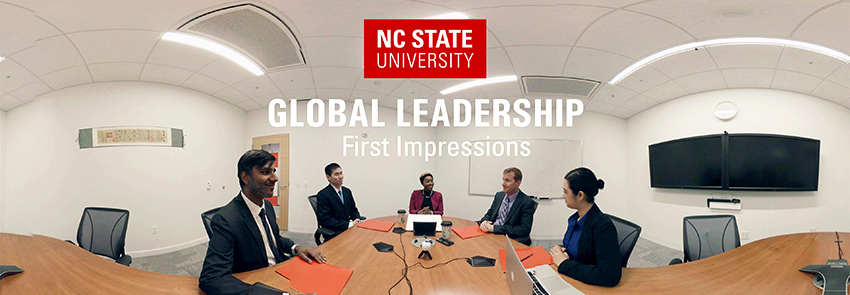
GlobalVR: Teaching Cultural Competencies Through Virtual Reality
First Impressions, an interactive 360° VR video experience, allows students to learn about culture on both a cognitive and emotional level. This VR-mediated lesson allows participants to dive into the minds of a global project team. The module gives students a chance to experience a situation from multicultural points of view.
Virtual reality provides unique opportunities for training related to leadership and management in a safe and engaging environment. This VR mediated lesson uses the principles of action learning, including two specific elements of conflict resolution: self-awareness and empathy skills. Participants learn to respond appropriately and effectively to a cross-cultural incident in a business situation. This VR mediated activity is intended to be used as part of a course aimed at developing global management and leadership skills.
Goals
The goals of the project were to explore the design and development process for creating immersive virtual reality scenarios that teach key cultural competency concepts, skills and abilities as well as design a framework and process model to be used in for the future creation of similar learning experiences. In addition, explorations and research would be captured and documented in order to contribute to NC State’s knowledge about how to appropriately use virtual reality experiences in an educational context.
Project goals included:
- Design and develop VR scenarios for a targeted student audience that teach key cultural competency concepts, skills and abilities as well as simulate common intercultural encounters to assess the identified learning outcomes.
- Explore, research and experiment with different “flavors” of virtual reality in order to find the appropriate “fit for purpose” as well as engage NC State University partners and share VR learning
- Design a framework and process model to be used for the future creation of similar learning experiences for other university-related audiences across the university.
Broadly, the First Impressions VR module is intended to reach Global Training’s undergraduate and graduate student populations. More specifically, the target audience is undergraduate engineering students, which is the largest college at NC State. Only 20-25% of all students get a chance to study abroad during their time at the university. The other 75-80% are unable to study abroad because of financial constraints or they do not believe there’s room in their degree plan to allow for it, including many engineering students. Since global competencies are sought after when hiring engineering students, the VR module was developed with undergraduate engineering students in mind to add to the competitive edge for students graduating from NC State.
Highlights and Solutions
- This virtual reality experience gives students a unique first-person perspective into cultural differences they may encounter as a global professional.
- The First Impressions VR module allows participants to dive into the minds of global partners and engage in learning about culture on both a cognitive and emotional level. This 10-minute module includes two scenes. In the first scene, individuals observe a global business meeting in Asia. During the meeting, there are several employees from different cultures whose task is to work together on a global project. The scene represents several interactions among the employees as they engage in different conversations that lead to conflict. During this part of the experience, users can start to see and feel some of the tension based on the employees’ interactions.
- The second part of the virtual experience allows the user to select one of the employees and assume their role from a first-person point-of-view. The first-person perspective is further enhanced by freezing time and hearing the thoughts of your alternate self. These thoughts reveal cultural assumptions that represent different cultural dimensions involved in communication. The resulting experience gives students a sense of visual and audible presence that differs from traditional media forms.
- This VR module is used as part of a two-hour in-person workshop where participants go through inductive reasoning exercises to explore cultural dimensions regarding how different cultures view time, build trust in working relationships, communicate, adhere to protocols, and view power and authority in the workplace. Participants then explore strategies that can be used to help bridge gaps between various cultures.
- The virtual reality scene is a component of a more comprehensive approach to developing cultural competence as directed by the Global Training Initiative. Participants are not only learning that people from other cultures may think and behave differently, but they are also able to experience it for themselves.
- The use of VR and specifically 360° video or ‘cinematic VR’ provides a mechanism for immersing our end-users in a different time and place. This use of interactive 360° VR video was a first at the university. It also incorporated a new process and technique for filming first-person-point-of-view experiences.
Related Links:
Teaching Cultural Competencies Through Virtual Reality
For more information about DELTA services, please contact LearnTech.